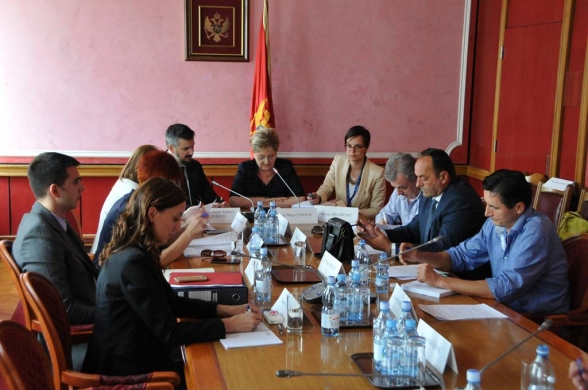At today's 37th meeting of the Committee on European Integration, members of the Committee got informed about the contents of several documents prepared by the Ministry of Foreign Affairs and European Integration, for the purpose of monitoring the level of harmonisation of laws with the EU legislation, and overall progress in the reform process.
Ambassador Aleksandar Andrija Pejović,Chief Negotiator for Montenegro's Accession to EU, presented documents from the agenda of the meeting. In his presentation of the Fifth Quarterly Report on the Overall Activities within Montenegro’s Integration Process to the European Union, for the period January – March 2015, Mr Pejović placed accent on opening of two negotiation chapters 16 – Taxation and 30 – External relations, and adoption of the Action Plan for Chapter 19 – Social policy and employment, as well as reasons for establishing National Investment Commission, which would be in charge of defining the list of the most important infrastructural projects in line with requests of the EC.
While presenting the Montenegro’s Accession Programme to the EU, for the period 2015-2018 (PPCG) and the First Quarterly Report on the Implementation of Commitments arising from the PPCG, Ambassador Pejović said that PPCG, as a document revised at the annual level, presented a medium–term plan of harmonisation of legislation, with clear deadlines and holders of obligations. According to him, a total of 167 strategic documents were planned for the four-year period as well as 1,076 of legislative regulations. When it comes to meeting obligations in the first quarter of the current year, he said that implementation of those was not at the satisfactory level – having in mind that only 48% of those have been implemented in the part of legislative regulations, and 73% in the part of strategic regulations, hence it is necessary to adopt a recovery plan and intensify efforts by the competent bodies. MPs discussion was related to results achieved in chapter 12- Food safety, veterinary and phytosanitary policy, system of handling asylum requests as well as the need of introducing the system of protection of minorities through improvement of legislative system.
MPs also discussed the Appendix to the 2015 Progress Report on Montenegro by the European Commission, for the period 1 September 2014 – 1 April 2015, representing one of the sources of information on the basis of which the EC prepares annual progress reports. Mr Pejović informed MPs with the novelty in drafting progress reports, which, for this year will comprise the overall analyses of several key chapters, with the aim of easier comparison with results of other candidate countries. During the discussion, the interlocutors expressed the opinion that MPs should participate more actively in drafting the Appendix sent to the European Commission, and different positions on the need for amending the form of the document were also expressed.









